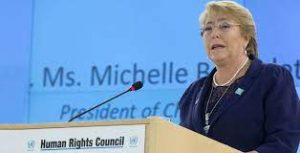
She sought to put her best foot forward in her first appearance following her controversial visit to China. In the opening moment of her statement Michelle Bachelet, the UN High Commissioner for Human Rights reflected the positive aspects of her trip:
Let me start by thanking the Government of China for its invitation. For the first time in 17 years, a UN High Commissioner for Human Rights has been able to travel to China and speak directly with the most senior Government officials in the country, and other interlocutors on key human rights issues, in China and globally I appreciate the Government’s efforts in making this visit happen, particularly the arrangements for my virtual meeting with President Xi Jinping.
She has received dramatic criticism from the human rights community. As identified in the NYT, the comments from Sophie Richardson, the China director at Human Rights Watch dismissed the Commissioner’s efforts: “That mandate requires a credible investigation in the face of mountains of evidence of atrocity crimes, not another toothless dialogue.” A second comment by Kenneth Roth, the director of Human Rights Watch underscored the harsh negative view expressed by the human rights community (NYT, June 13, 2022) : “There was no condemnation from Madame Bachelet even remotely commensurate with the severity of the atrocities being committed in Xinjiang, … She gave up her most powerful weapon for a back room dialogue which will be meaningless.”
These conclusions appear jarring for the praised UN High Commissioner for Human Rights and a progressive who was a young activist in Chile held by the secret police following the Pinochet coup, possibly tortured, and ending with her exile from the country though she returned to serve as Minister of Health and then as Defense Minister before being elected President of Chile in 2010 and again in 2014.
And after the High Commissioner announced that she would not put herself forward for a second term, soon after her return from China, there was more than hint in the media that the trip itself was responsible for this decision. However, in talking with Chilean colleagues a number pointed out to me that it was known for several months that she would not stand again. But there is no dismissing the anger, especially in the human rights community and among the Uighur and other ethnic communities at the conduct of her trip, her failure to speak out against the human rights violations, and her perceived cosiness with the Chinese Government.
As Richard Gowan the UN director at the International Crisis Group said: “China had made the trip a “public relations mess for the UN” … But Gowan then added these views of Bachelet’s trip in the FT:
… the envoy’s trip should be seen in the same light as UN secretary-general António Guterres’s meeting with Russian leader Vladimir Putin last month. “If the UN was not seen to go, that is even more damaging for the residual hope that UN can do some work of value,” he said. “In a sense, she is sacrificing herself because we’ve known from the get-go that there wouldn’t be real Chinese transparency. It’s a trap. But it’s a trap that Bachelet had to walk into. ”
So, the question arises: who is right? Was her trip a disaster because she failed to publicly take the Chinese Government to task for the many alleged human rights violations, and violations of international human rights law that these groups insisted needed to made public by her. Or, can one conclude that she has initiated a ‘long game’ with the Government of China that may hold out the possibility for improvements in the future of Chinese Government behavior. Certainly, Commissioner Bachelet believes that continued engagement is the way forward. This way, it seems, will bear human rights improvement if not now then in the future. As she identified in her statement:
We agreed to establish regular engagement between the UN Human Rights Office and the Government of China, including through an annual senior strategic meeting for discussion of issues of respective interest at national, regional, or global levels.
We also agreed to establish a working group to facilitate substantive exchanges and cooperation between my Office and the Government through meetings in Beijing and in Geneva, as well as virtual meetings. This working group will organize a series of follow-up discussions about specific thematic areas, including but not limited to development, poverty alleviation and human rights, rights of minorities, business and human rights, counter-terrorism and human rights, digital space and human rights, judicial and legal protection and human rights, as well as other issues raised by either side. …
This will allow for structured engagement of my Office with China on a number of human rights issues. This is especially important as my Office does not have a country presence. The working group will also provide a space for us to bring to attention of the Government a number of specific matters of concern.
The Government has also stated that it will invite senior officials from the Office to visit China in the future.
There is a continuing conundrum in human rights law. Do revelations of wrong doing and the harsh condemnations of the violations of human rights trump actions, or is continuing engagement even if organizational and bureaucratic more likely to advance human rights improvements. Calling out the violations and breaches are at the heart of the human rights groups. But there remains the nagging concern that such efforts fail to achieve the most vital result – an improvement in human rights behavior of states and groups alike.
Recently a number of thought leaders from the CWD process have sought to grapple with a discourse on human rights that did not simply further divide and polarize US-China and the wider global order relations among democratic and authoritarian regimes. The rhetoric is powerful but ultimately improvement lies elsewhere. It may well be that that was what Michelle Bachelet concluded.
Image Credit: news.un.org

